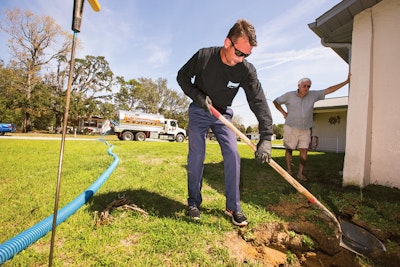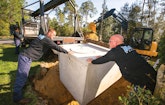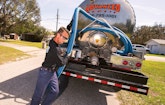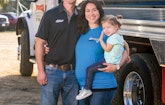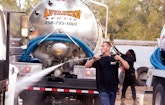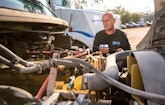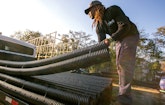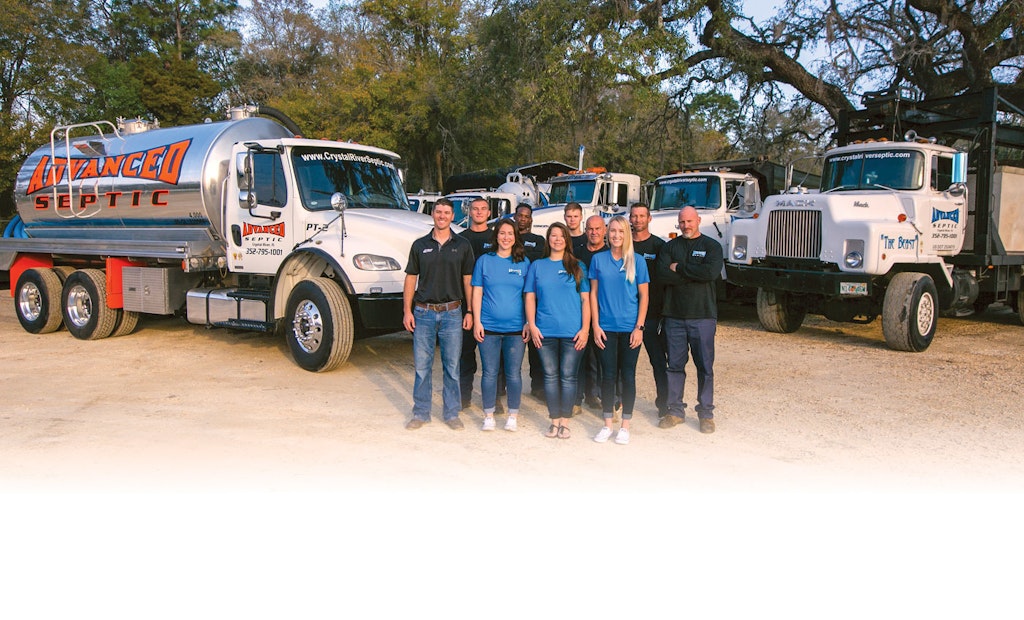
Interested in Onsite Systems?
Get Onsite Systems articles, news and videos right in your inbox! Sign up now.
Onsite Systems + Get AlertsFrom uniformed route drivers to gleaming trucks, to a strong focus on educating customers about best practices for maintaining septic systems, it’s clear that Brandon Buckingham promotes professionalism as a core trait of his company, Advanced Septic in Crystal River, Florida.
The reasons he does so are compelling. First of all, it was instilled in him by his father, Harold Buckingham Jr., who also ran a pumping company. He’s also a part-time firefighter for the Crystal River Fire Department, a profession that demands putting a best foot forward in public. But on a broader level, running a professional outfit helps Buckingham develop a distinct brand for his company — avoiding industry stereotypes — that helps him more effectively market Advanced Septic.
Last but not least, he says that how customers and the general public perceive his business and its employees reflects directly on him. “I’m a proud individual,” he explains. “It’s my name on the business and on the trucks, so I want to be sure everything looks like it’s the best.
“The septic industry is not a very clean or glorified industry,” he adds. “It’s not something that people generally want to discuss or deal with. But I feel that if we look clean and professional, people will hire us because they believe that our work will be professional, too. So far, it seems to be working great.”
STARTING OUT YOUNG
Indeed, Advanced Septic — which derives about 55 percent of its revenue from septic tank pumping and the rest from system installations and maintenance — has flourished since Buckingham founded the business in 2007. He started out with a used vacuum truck, a pickup truck, a mini-excavator and one employee: himself. Now the company runs three vac trucks and owns a variety of other vehicles and machines, and employs 10 people.
Buckingham grew up in the business, which gave him the experience needed to run a portable sanitation company. “Sure, it’s difficult to run any business,” he says. “But I already had a pretty good idea of what to do, and my parents helped out a lot. I basically started from nothing — bought equipment when I could afford it and grew from there.”
Buckingham’s roots in the industry actually go back further than his father. His grandparents, Linda and Harold Buckingham Sr., ran a septic service business from 1960 to the mid-1980s in Seminole, a small city 15 miles west of St. Petersburg. Harold Buckingham Jr. also ran one in Crystal River, located about 80 miles north of Tampa, for 20 years or so.
Buckingham worked for his dad from the time he was a youngster. “We still have photos of me helping out when I was 4 or 5 years old,” says Buckingham, now 30. “So I’ve been doing this for a while.”
His father sold his business in 2007, which prompted Buckingham to strike out on his own. “He asked me if I wanted the business, because it was supposed to be mine,” he explains. “But he got an offer he couldn’t refuse, so I told him to take the money. I really wanted my own outfit anyway. … I didn’t want to work under his shadow forever. It’s a little weird now because I compete against my dad’s old business, but you kind of get used to it.”
THE PATH TO GROWTH
The company has grown considerably during the last decade. Gross revenue has doubled annually over the last three years, and Buckingham says it’s on pace to do it again in 2017. “The market has a lot to do with it,” he points out. “People are more willing to spend money now on repairs and new installations.”
Part of that growth stems from Advanced Septic offering more services than its name implies. The company also does excavating; installs water, sewer and stormwater lines; pumps grease traps; and cleans drainlines and lift stations. The business even owns 10 portable restrooms, made by PolyPortables. While the restrooms provide minimal revenue, they fit into Buckingham’s philosophy of making the company as much of a one-stop shop for customers as possible.
As Advanced Septic’s services and customer base grew, so did its roster of equipment. The company currently runs three vacuum trucks: a 2009 Freightliner equipped with a 4,000-gallon aluminum tank and Fruitland Manufacturing pump built by Engine & Accessory Inc.; a 2006 Freightliner with a 2,600-gallon steel tank and Jurop/Chandler pump built by Central Truck Sales; and a 1993 Kenworth tractor trailer that Buckingham self-fabricated with a Fruitland vacuum pump and a 5,500-gallon steel tank (once was used by a farmer to haul molasses).
The company also owns three flatbed trucks — a Freightliner, a Chevrolet and a GMC — for hauling drainfield supplies; a John Deere 50G mini-excavator; a John Deere 60G mini-excavator; a Kubota 7060 grading tractor; a John Deere 333 skid-steer; a 1993 Ford L8000 dump truck with a 12-cubic-yard dump body manufactured by R/S-Godwin Truck Body Co.; and a 1983 Mack rack truck equipped with a 20,000-pound Hydra-Brute crane made by Del Zotto Products of Florida for setting septic tanks.
For installing septic systems, Buckingham uses products made by Plastic Tubing Industries and ADS, and concrete tanks manufactured by Del Zotto Products and Bonded Septic Tank.
LOOKING GOOD
Investing in good equipment and keeping it well maintained is part of Buckingham’s approach to professionalism. “If someone pulls up in a beat-up truck and nasty-looking clothes, it’s hard to convince customers that the work is going to be fully professional,” he points out. “And at the end of the day, that’s why customers hire companies — they believe you’re a professional.”
Route drivers are required to look as sharp as their trucks. They wear company-issued blue pants or shorts, a gray shirt emblazoned with the company’s name, and proper work boots. They can also wear company-logoed baseball hats, if they want.
Employees in the field can also wear company-logoed fluorescent orange or yellow shirts. “It’s all about brand marketing,” Buckingham explains. “I view us as a brand as well as a company. I like eye-catching, vibrant colors that stand out. At the end of the day, it’s all about name recognition. If a bright-colored shirt grabs someone’s attention, all the better.”
If necessary, drivers also get training to properly interact with customers as well as educate them about septic system usage and maintenance, and why they’re important. Buckingham says that when hiring route drivers, he looks for people who are motivated and have a great attitude. “I’m big on high morale and good attitudes,” he says. “I want employees who are willing to work their butts off and treat customers the way they (the employees) would like to be treated.”
To Buckingham, being a wastewater professional also means working with an environmentally conscious mindset — realizing that, in no small way, pumpers are stewards and protectors of a precious resource: water. That’s especially important in Crystal River, which is known as the manatee capital of the world. Every winter, roughly 600 of these friendly marine giants spend winters in the Crystal River area, home of the Crystal River National Wildlife Refuge — the only such refuge created specifically to protect the endangered Florida manatee.
“I’m an avid hunter and fisherman, so I understand full well the importance of conserving our natural resources,” he says. “So we make sure that we put our best foot forward and be environmentally conscious — no job site spills and making sure tools and hoses are clean — so that future generations can enjoy things.
A BRIGHT FUTURE
“It all goes back to professionalism,” he adds. “Professionalism goes hand in hand with good environmental practices.”
Looking ahead, Buckingham expects bigger things for his company, noting that the rural area around Crystal River continues to grow in population. “There’s not a lot of big pipe (sewers) in our area and not a lot of demand for it, either,” he says. “So with our equipment and employees, we’re well positioned for more growth.”
Doing our own disposal
Faced with high septage disposal rates and a nearly two-hour round trip to the nearest treatment plant, Brandon Buckingham — owner of Advanced Septic — decided to handle the waste at his company headquarters in Crystal River, Florida.
“It is much easier for us and more cost-effective to treat everything ourselves, versus taking it somewhere and paying to dump,” he explains, noting that the nearest treatment plant charges nearly 10 cents per gallon for disposal. “We haul anywhere from 30,000 to 50,000 gallons a week. So if you do the math, it’s a no-brainer.”
Buckingham built the 30,000-gallon-capacity facility himself and says it wasn’t that difficult. Trucks off-load waste into a large screening tank that filters out trash. From there, waste travels to a larger tank, where hydrated lime is mechanically injected. After that, it’s land-applied on property the company owns.
Building the treatment center cost about $30,000. There are other costs to consider, such as electricity, lime, labor, and the time it takes to haul waste for land application.
“The majority of septic companies around here have their own treatment plants,” Buckingham points out. “Ours has paid for itself. If you can treat waste in-house, it’s by far the most cost-effective way of doing it.”
